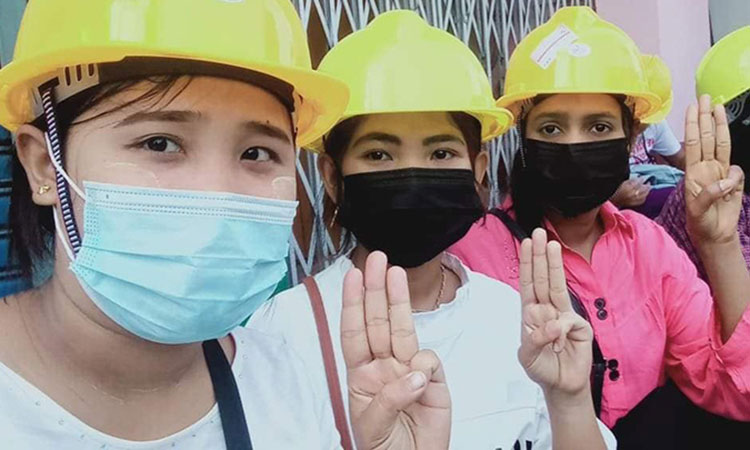By Wulan Dari | Union Aid Abroad-APHEDA
Union Aid Abroad-APHEDA (Australia) and Mondiaal FNV (the Netherlands) have produced an infographic on the situation in the country. Although the statistics presented in the document do not reflect the actual numbers, which are higher than the data recorded, it does nonetheless illustrate the massive scale of attack on workers and trade unionists after the coup.
The infographic covers, by sectors, the total number of workers suspended, dismissed, arrested, and killedin the country. It also lists, by ownership and investors, the national companies and multinationals working in the country.
The ITUC’s Global Rights Index 2021 has listed Myanmar as one of the worst countries for working people, a major setback of what had been achieved during a decade of transition toward democracy (2011-2021). A remaining priority is to keep organising concerted action by the international community to press the junta and demand the release of all political prisoners.
In addition, access to justice and remedies for victims of extrajudicial killings and arbitrary detentions is an area that the international community should also focus on. The international community, Myanmar unions, and the parallel government of the National Unity Government need to initiate discussion on measures to reform the law and legal institutions in Myanmar and on a mechanism to hold the State Administration Council, as an entity, accountable for perpetrating actions against human rights – all of this within the frame of restoring democracy and guaranteeing the right to freedom of association.
The situation in the country thus far
The junta is applying such laws inherited from the colonial era as the Penal Code and the Unlawful Association Act. Both have been frequently used to lock up workers, trade unionists, and those who participate actively in the Civil Disobedience Movement, with a minimum three-year prison sentence.
The junta’s administration, the State Administration Council, referred to various sections of the military-drafted 2008 constitution to further justify its action. The declaration of a state of emergency and the enforcement of martial law in townships in Yangon and Mandalay, where major industrial zones are located, were carried out under section 419. Meanwhile, section 432 provides legal impunity for any actions taken by the military personnel under a state of emergency. Mobility restriction and a ban of public gathering of more than five people in 31 townships in Yangon and other major cities across the country have been imposed since 8 October and carried out under section 144 of the constitution. At least two labour organisers and one worker were sentenced to life at the military tribunal. One prominent unionist, the general secretary of Myanmar Industry Craft Service-Trade Unions Federation (MICS-TUsF), will potentially have his case tried at a military tribunal.
This flawed legal system has been a specter haunting trade unionists, journalists, and critics in any given political circumstances in Myanmar. Indeed, the military, after the coup, have further abused the laws to justify their actions. According to Assistance Association of Political Prisoner-Burma (AAPP-B), as of 25 October 2021, 4065 victims had been released from prisons. As of 1 November, AAPP-B recorded that 7013 people were still under detention, with only 300 having been sentenced. Several workers and unionists are among those granted amnesty and released within the period 18-22 October, while one unionist was rearrested at the prison gate a minute after his release.
Update from the TUDCN - A development backlash
The military coup in the country was also an attack on the people of Myanmar’s vision of a country that transits towards a society that is just and sustainable. A few months before the coup, the country was planning to present its first Voluntary National Review on its implementation of the SDGs at the UN High-level Political Forum on Sustainable Development in July 2020. In preparation for this opportunity, the ITUC Trade Union Development Cooperation Network (TUDCN) was supporting the Confederation of Trade Unions of Myanmar (CTUM) to draft their first SDG report “A trade union focus on the SDGs”, a tool to provide an independent trade union assessment of SDGs progress in the country and voice their priorities to accelerate action towards the 2030 Agenda. Unfortunately, the coup put an abrupt end to this process, destroying the achievements realised in this field and pushing the country back to development incertitude.
A campaing to support the workers on the frontline standing against the junta!
People, workers and unionists are fighting back. They stand strong in defense of democracy and liberty. And any help they can receive will make them stronger. Therefore, the ITUC is running the campaign ’Defend Democracy in Myanmar’ in support of the workers of Myanmar, who are on the frontline and leading change against the junta. They truly are democracy heroes and their fight is our fight!
Stand in solidarity with them by supporting the strike fund!
- Support the campaign ’Defend Democracy in Myanmar’
- Download the full version of the infographic (PDF)
- Download a shorter version for social media (JPG)
* Photo: Federation of General Workers Myanmar (FGWM)


